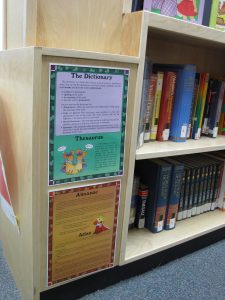I know that I know a lot more than I did when I first began this course, and I feel better equipped to help students and other teachers. I no longer see reference materials (well, most of them anyways) as stuffy and boring. They can be colourful and appealing, drawing the reader in and making them thirst for more of the same. I am excited about resources like World Book online, and have promoted this resource to other teachers. I plan to continue to explore reference resources, and will definitely be better able to guide students and teachers to a wider variety of reference materials.
I know that there is plentiful material to guide me along the learning journey. I have learned about specific resources and in addition, I have learned how to more efficiently access new material. I guess that means I have better learned how to better learn. Learning how to learn is not just for the young. It’s for all ages, and yes, you can teach an “older” dog new tricks!
I also know that when it comes to collaboration and introducing newness, the aim is to influence, not change people. Self-awareness and understanding of one`s own response and reaction to change is paramount. Self-awareness breeds empathy. Without that leadership becomes ego-based and does not foster collaborative relationships. Change is a process, not an event, and learning, especially internalization of learning, lead to change. I love this connection of basic psychology to library work!
I wonder about….well, a LOT of things, because I love to learn. One thing I wonder about is technology, and how it will continue to influence teaching and learning. Some classrooms no longer have even a white board in them – it’s been replaced by a projector and/or a smartboard. (How will they manage in a power failure, I wonder?) While I agree that embracing and integrating learning technology in a world of iPods, iPads and the like is imperative, not optional, I have concerns making classrooms utterly dependent on it. That said, I do feel much better prepared to explore and utilize digital resources than I did three months ago. And I have an important role to play in teaching the skills to manage technology and information.
I also wonder how teacher-librarians can reach out beyond the core subject areas and teachers. How about an interesting inquiry project for art, food or tech ed? Some of these students are in danger of being left behind because academics are not their strength, and are at risk of graduating with underdeveloped information literacy skills. I think it is important to build relationships with teachers of these subject areas, with a goal of bring their classes into the library and computer lab to explore some interesting and “cool” resources. Since I have first-hand experience teaching home economics, perhaps I can offer that unique link as a teacher librarian.
Knowing, wondering, learning – it’s a cycle that, in an iDeal world, spins throughout the life cycle.
And so it goes: iKnow iWonder iLearn. Embedded in this is: inquire, create and reflect, applying this process repeatedly across subject and time. For inquiry, I think Leonardo DaVinci had the right idea when he reportedly said “Let curiosity be your guide”. A creative act synthesizes raw materials into something new. The raw materials generate i-D-ahs! followed by concrete creation . Reflection is a me-search quest as we search within to sort what we know, what we wonder, and what we still need to learn. Me-search can therefore lead to more research. Like I said, so the journey goes!

